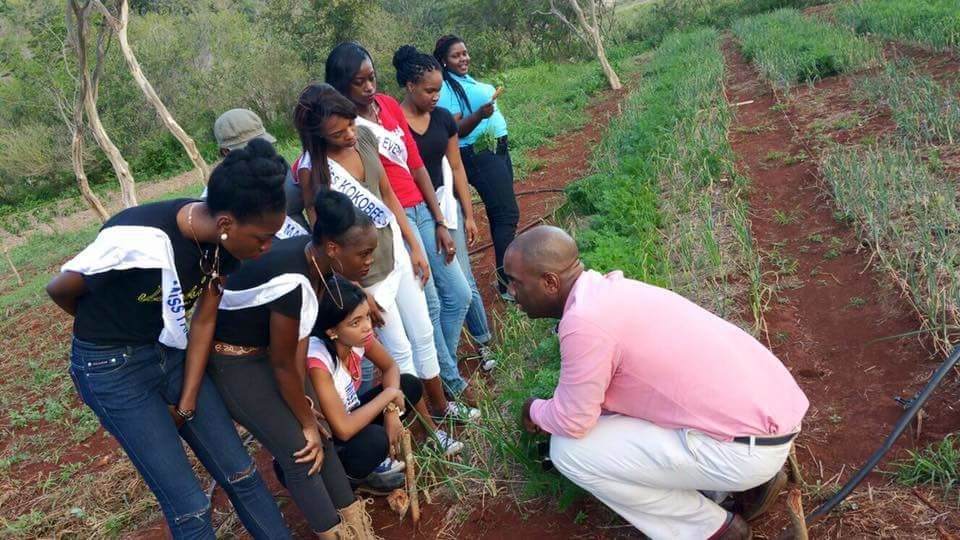This Man is Revolutionizing How Jamaica Farms

Neil Curtis is revolutionizing how Jamaica farms. Born to Jamaican parents in the United States, Curtis has always had a deep connection to the island his parents called home, and, as a person of the Jamaican diaspora, he’s wanted to give back to his ancestral homeland in a meaningful way.
In 2013, he traveled to Jamaica after inheriting a family member’s cocoa farm, and soon realized local farmers lacked easy access to necessary information and resources. Curtis decided to take action, and launched Farm Up Jamaica. The non-profit connects current agriculture school students with local farmers who have transitioned to organic farming. On top of that, Farm Up Jamaica’s main goal is to reduce foreign food imports and increase agricultural exports through climate-smart agriculture. Based in New York City, Curtis has worked relentlessly to ensure Farm Up Jamaica, which now works with about 30 farms, serves both the farmers and the Jamaican economy.
Outpostings sat with him on one of his recent visits to the island at The Spanish Court Hotel in New Kingston to learn more about his mission and why the Jamaican agriculture industry deserves major respect. Here, Curtis gives us an in depth look at Farm Up Jamaica.
How did you settle on a non-profit focused on agriculture?
I looked at all the areas in Jamaica we could help, and agriculture was the most neglected sector. Agriculture only represents six percent of the Jamaican GDP, while tourism represents anywhere from 40 to 60 percent. We thought that this was a place that we could actually have a measurable impact.
What makes Farm Up Jamaica different from remittances?
The idea was to raise funds from Jamaicans that live abroad, those of the diaspora, to help make a tangible difference in Jamaica. Most people send through remittances, but those don’t teach anyone how to fish. It’s giving them the fish. At Farm Up Jamaica, we want to teach farmers and young agriculture students how to become Jamaica’s new farmers.
We’re placing agriculture students onto farms and we’re assisting existing farmers. We want to help to bring the youth back into farming.
We read that you want to promote sustainable agriculture as a “valuable” industry.” Have the young agriculture students taken to this belief?
We are in the process of that perception switch right now. The majority of the farmers here trust companies that come in and sell them on using chemicals. When the students learn organic farming at Farm Up Jamaica, they don’t want to go back to chemical farming. They realize how important organic farming is, and that it can impact their lives and the lives of others. We are touching the youth at the heart, and they are beginning to convert from conventional to organic farming.
How has it been working with farmers in Jamaica and advising them to convert to organic farms?
You have farmers that are going to be chemical farmers, and then you have farmers who are more open to change. The people who are currently not interested—who make the majority of Jamaica’s 275,000 registered farmers—are sold on the chemicals and the pesticides because that’s what they’ve used since God spoke to Moses.
So we work with the farmers willing to work with us, leaving be the ones who’d make us get stuck in a fight and pull teeth. I believe once these unwilling farmers see what their peers are actually accomplishing through organic farming, then they will come on board afterward.
We’ve read that Jamaica imports over $1 billion in food. Does Farm Up Jamaica focus on providing food for domestic use or for export and how will this impact the local economy?
Both. Part of our system is that the farmers must put a certain percentage of food into the local community in order to get the bigger dollars from exporting.
America is consuming about $40 billion a year in organic foods, but only ten percent of that is grown in America. The other ninety percent is grown outside of the country. Jamaica could be a great supplier of organic food to one of the largest consumer of organic foods. All we have to do is focus in on that and make this a widespread effort.
What have been some of your biggest obstacles with Farm Up Jamaica, and how have you overcome them?
Our biggest obstacle has been raising sufficient funds to do an infinite amount work. It’s been difficult getting donors involved in an organization that is working to change agriculture.
Another obstacle is finding farmers who are consistently willing to do work and prove that this business model works. Reliable farmers will be our most valuable resource. They will be our greatest network because we’ll know exactly which farmers are reliable and accomplish the goals of Farm Up Jamaica.
We want to make sure that when we are done, everybody had an opportunity to become a part of something. We want to tie the people of the Jamaican diaspora, all 3.3 million of us, to make Farm Up Jamaica a success.
For more information on how to help Jamaican farmers, visit the Farm Up Jamaica website.